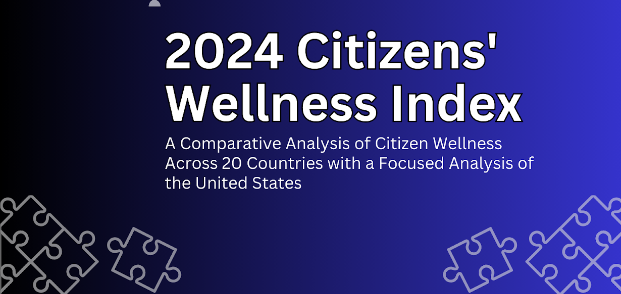2024 Citizens' Wellness Index

Executive Summary
Purpose: This study aims to measure the overall wellness of citizens across 20 countries using 40 global rankings from established organizations and institutions. The primary goal is to derive insights into the United States' performance within a broader global context.
Key Findings: Economic Powerhouse but Social Inequality Persists:
- The U.S. ranks highly in income and financial wealth (2nd) and maintains strong economic freedom (25th). However, it faces significant challenges with income inequality (97th on the Gini Index) and poverty (54th), highlighting the disparity between overall wealth and equitable distribution of resources.
Public Health Crisis:
- Despite being a leader in healthcare spending and innovation, the U.S. struggles with severe public health issues, ranking 178th in obesity prevalence and depression rates. Additionally, the U.S. underperforms in healthy life expectancy (72nd) and infant mortality (54th), signaling critical gaps in healthcare access and quality.
Strong Civic Engagement, Yet Governance Concerns:
- The U.S. shows strength in civic engagement (7th) and charitable giving (6th), reflecting a culture of participation and generosity. However, it faces governance challenges, ranking 24th in corruption perceptions and 26th in the rule of law, indicating declining trust in institutions and transparency.
Safety and Security Challenges:
- The U.S. ranks poorly on safety-related metrics, with low scores in the Global Peace Index (132nd) and safety and security (69th). High crime rates, gun violence, and mass incarceration significantly impact citizen wellness and contribute to the U.S.'s lower rankings in global peace and security.
Environmental Sustainability Lags Behind:
- The U.S. ranks 34th on the Environmental Performance Index, falling behind many developed nations in sustainability efforts. High carbon emissions, reliance on fossil fuels, and inconsistent environmental policies are barriers to achieving stronger environmental outcomes.
Middle-Tier Education Performance:
- The U.S. shows moderate performance in education, ranking 17th in 4th-grade math scores and 11th in 4th-grade science scores. Despite strong digital readiness (4th), the U.S. ranks 20th overall in education, reflecting disparities and challenges in the public education system.
Methodology Overview: The study draws on 40 global rankings from credible organizations, evaluating six pillars of citizen wellness: education, government, health, wealth, involvement, and society. These rankings were synthesized into metadata and analyzed to produce an overall wellness score for each country.
Introduction
Background: Numerous credible reports compare the United States to other nations on various metrics. These reports vary in focus, with some evaluating abstract concepts like prosperity, while others hone in on specific factors such as depression rates. Together, they offer a composite picture of how countries perform across a broad spectrum of citizen wellness indicators.
Research Question: By analyzing 40 established global ranking reports (GRRs), what insights can be drawn about overall citizen wellness? Specifically, what do these findings reveal about the United States?
Objectives:
- Develop a Citizen Wellness Index (CWI) score for each country.
- Rank countries based on overall citizen wellness.
- Provide a detailed analysis of the U.S.'s position in the global rankings.
Literature Review
Existing Research: Several studies have attempted to quantify "citizen wellness" through various indices that examine different dimensions of life quality, such as health, economic stability, education, social support, safety, and governance. Below is a summary of the most significant studies, with a focus on U.S. outcomes:
- Human Development Index (HDI) - UNDP: The U.S. ranks highly in GDP per capita and life expectancy, placing it in the global top 20. However, it lags in education and inequality-adjusted rankings compared to top performers like Norway and Switzerland.
- World Happiness Report - SDSN: The U.S. consistently ranks within the top 20, but its position has fluctuated due to rising income inequality, political polarization, and mental health challenges. Economic wealth boosts the U.S.'s ranking, but lower scores in social support and perceptions of corruption hinder it compared to Nordic countries.
- Global Peace Index - IEP: The U.S. ranks poorly, typically around 120th out of 163 countries. High levels of violence, incarceration rates, and military spending contribute to its low position relative to peaceful nations like Iceland or New Zealand.
- Environmental Performance Index (EPI) - Yale & Columbia: The U.S. performs around the middle of the pack. High carbon emissions and inconsistent environmental policies cause it to trail behind European leaders. Shifts between administrations contribute to its volatility in this ranking.
- Corruption Perceptions Index - Transparency International: The U.S. has declined in recent years, ranking around the 25th percentile. Factors such as political instability, weakened checks and balances, and lobbying concerns have contributed to this drop.
- Global Gender Gap Report - WEF: The U.S. ranks in the mid-range, often between 30th and 50th place. Gender inequality in political representation and economic participation remains a challenge, despite progress in education and health-related gender gaps.
- Economic Freedom Index - Heritage Foundation: The U.S. consistently ranks in the top 20. However, regulatory challenges and government intervention have caused it to face increasing competition from smaller economies like Singapore and Switzerland.
- Sustainable Development Goals (SDG) Index - Bertelsmann Stiftung & SDSN: The U.S. struggles with many SDG targets, particularly in climate action, inequality, and responsible consumption. Despite its wealth, it is not a leader in sustainable development.
- Global Slavery Index - Walk Free Foundation: While the U.S. ranks better than many developing nations, it faces issues of modern slavery in sectors like agriculture and domestic work. Among high-income countries, it performs poorly in addressing these issues.
- Work-Life Balance - OECD Better Life Index: The U.S. ranks poorly compared to other developed nations. High levels of work-related stress and fewer labor protections, such as paid parental leave, put it behind countries like Denmark and the Netherlands.
Methodology
Selection Criteria: Twenty countries were selected for this study: Australia, Austria, Brazil, Canada, Chile, Colombia, Denmark, Finland, France, Germany, Japan, Korea, Mexico, New Zealand, Russia, Sweden, South Africa, Turkey, the United Kingdom, and the United States. The selection was based on the following criteria:
- Availability of sufficient data for comparison.
- Generally recognized as developed nations, ensuring fair comparisons.
- A broad selection of 20 countries allows for a more comprehensive analysis.
Data Sources: The study utilized the following global ranking reports (GRRs):
Interpretation: For each GRR, the exact rankings of the 20 selected countries were input into the dataset. To ensure that positive rankings were appropriately weighted, data for reports where a lower rank indicated worse outcomes (e.g., high poverty rates) were reversed. Where rankings for certain countries were missing, the median score of the remaining countries was applied to ensure no bias. These adjusted values are noted in red in the metadata.
Results
The United States' performance across wellness indicators reveals a complex picture of strengths and weaknesses, reflecting the country's diverse socioeconomic environment. Below is an analytical breakdown of the U.S.'s performance across various dimensions of wellness—education, healthcare, income, safety, and society.
- Education
- 4th Grade Math Scores 2019: Ranked 17th out of 20 countries. Despite its global influence, the U.S. underperforms in foundational math skills compared to countries like Japan (3rd) and Korea (5th).
- 4th Grade Science Scores 2019: The U.S. ranks 11th, indicating slightly better performance in science education, though still trailing behind top performers like Korea (3rd) and Japan (5th).
- Education Ranking (OECD Better Life Index): The U.S. ranks 20th, reflecting challenges in its education system, including inequality and inconsistent outcomes.
- Digital Readiness Index 2021 (Cisco): The U.S. performs well, ranking 4th, highlighting its strong digital infrastructure and preparedness for the future of education and work.
Analysis: The U.S. demonstrates moderate performance in education, excelling in digital readiness but lagging behind in basic educational outcomes such as math and science. Persistent inequalities and disparities in public education systems are likely contributing factors.
- Healthcare
- Age-standardized Prevalence of Obesity Among Adults (WHO): The U.S. ranks 178th, indicating one of the highest obesity rates among the countries analyzed. This reflects significant public health challenges, including diet, lifestyle, and healthcare access.
- Depression Rates by Country (World Population Review): Ranked 178th, the U.S. shows alarmingly high levels of depression, pointing to mental health as a major concern.
- Environmental Performance Index (EPI): The U.S. ranks 34th, trailing behind most developed nations, especially in environmental sustainability.
- Healthy Life Expectancy (WHO): Ranked 72nd, the U.S. lags behind most developed countries, indicating that despite high healthcare spending, life expectancy remains a critical issue.
- Infant Mortality Rate (CIA World Factbook): Ranked 54th, the U.S. performs poorly in infant mortality compared to other developed nations, reflecting disparities in healthcare access and quality.
Analysis: Healthcare remains a significant area of concern for the U.S., with poor outcomes in obesity, mental health, and infant mortality. Despite leading in medical innovation and healthcare spending, access and inequality issues undermine overall health outcomes.
- Income & Wealth
- Economic Freedom Index (Heritage Foundation): Ranked 25th, the U.S. performs moderately well in terms of economic freedom but faces increasing competition from countries like Singapore and New Zealand.
- Gini Index (Wealth Inequality) Rankings (Statista): The U.S. ranks 97th, reflecting high levels of income inequality, a persistent issue that exacerbates other social and economic challenges.
- Housing Prices (OECD): Ranked 33rd, housing affordability remains a significant challenge in the U.S., with rising costs outpacing wage growth.
- Income/Financial Wealth Ranking (OECD Better Life Index): The U.S. ranks 2nd, reflecting strong financial wealth overall, but this is offset by the high inequality shown in the Gini Index.
- Most Expensive Countries (CEOWorld.biz): Ranked 113th, indicating that while the U.S. is not one of the most expensive countries to live in, affordability varies greatly across regions.
- Poverty Rate by Country (World Population Review): Ranked 54th, the U.S. has a relatively high poverty rate compared to other developed nations, highlighting the economic disparities that persist.
- World Competitiveness Ranking (IMD): Ranked 12th, the U.S. remains a global leader in competitiveness, driven by innovation, business efficiency, and a robust labor market.
Analysis: While the U.S. continues to be a powerhouse in terms of overall wealth and competitiveness, income inequality, high housing costs, and significant poverty levels present major challenges. The U.S. exhibits a dual economy where wealth is concentrated at the top, leaving large portions of the population economically vulnerable.
- Safety
- Global Peace Index (Institute for Economics and Peace): The U.S. ranks 132nd, indicating high levels of violence, incarceration, and military spending. This low ranking reflects significant issues with domestic safety and international conflicts.
- Safety & Security (Legatum Prosperity Index): Ranked 69th, the U.S. underperforms in safety and security, aligning with its low Global Peace Index ranking.
- Rule of Law Index (World Justice Project): The U.S. ranks 26th, showing moderate performance in maintaining the rule of law but still lagging behind countries like Denmark and Finland.
Analysis: The U.S. faces substantial challenges related to safety, with high crime rates, mass incarceration, and a heavily militarized society. These factors contribute to its low performance on global peace and safety indices, reflecting deep-rooted societal issues.
- Society
- Global Gender Gap Report (World Economic Forum): The U.S. ranks 43rd, indicating moderate gender equality but still trailing behind leading nations like Sweden (5th) and Finland (3rd).
- Human Development Index (UNDP): Ranked 20th, the U.S. performs well overall, but inequality-adjusted measures highlight persistent disparities in health, education, and income.
- Life Satisfaction Ranking (OECD Better Life Index): The U.S. ranks 14th, showing a decent level of life satisfaction, but not among the top performers, which are primarily Nordic countries.
- Living Conditions (Legatum Prosperity Index): Ranked 29th, living conditions in the U.S. vary significantly across regions, contributing to its middling performance.
- Personal Freedom (Legatum Prosperity Index): The U.S. ranks 29th, reflecting a balance of individual freedoms with societal constraints, though it lags behind top performers like Denmark and New Zealand.
- Social Progress Index (Social Progress Imperative): Ranked 29th, the U.S. performs moderately in social progress but trails behind many European nations, reflecting areas like healthcare, education, and safety where improvements are needed.
- World Happiness Report (SDSN): The U.S. ranks 23rd in happiness, reflecting its mixed performance across economic, social, and health metrics.
Analysis: Societal metrics paint a picture of a nation with considerable freedoms and opportunities but facing significant challenges in gender equality, social progress, and overall happiness. Disparities in living conditions and access to resources continue to hold the U.S. back from ranking among the top nations.
Discussion
An overall rank of 13th out of 20 countries in the 2024 Citizen Wellness Index (CWI) highlights a paradox for the United States. Despite being an economic and geopolitical superpower, the U.S. struggles in several critical areas related to citizen wellness. A rank in the middle of the pack for a country of such influence raises important questions about the relationship between economic power and holistic well-being.
1. Economic Success vs. Social Well-Being
At first glance, the U.S.'s strong economic indicators, such as high income and financial wealth, might suggest it should rank among the top countries in citizen wellness. However, economic wealth alone does not equate to well-being. The U.S.'s middling CWI rank reflects deep-seated issues that offset its economic success, including income inequality, public health crises, and safety concerns.
- Economic Strength: The U.S. ranks 2nd in income/financial wealth and 25th in economic freedom, showing strong economic foundations.
- Inequality and Disparity: Despite its economic strength, the U.S. ranks poorly on the Gini Index (97th), indicating severe wealth inequality. This gap between the wealthy and the rest of the population undermines broader social well-being and contributes to the country's lower overall CWI rank.
2. Public Health Crises Undermining Wellness
The U.S.'s performance in health-related metrics is a significant factor pulling down its overall rank. The country faces public health crises that are particularly troubling given its wealth and access to medical innovation.
- Obesity and Mental Health: Ranking 178th in both obesity prevalence and depression rates highlights the depth of these public health issues. These are not just personal health concerns but societal problems that strain healthcare systems and reduce quality of life across the population.
- Life Expectancy: The U.S. also underperforms in healthy life expectancy (72nd), which further indicates that economic prosperity has not translated into better health outcomes for many Americans.
The dissonance between healthcare spending and outcomes is stark. While the U.S. leads the world in healthcare expenditures, it fails to deliver commensurate improvements in public health, dragging down its CWI rank.
3. Civic Engagement as a Bright Spot
One area where the U.S. consistently excels is in civic engagement and community involvement. High rankings in civic engagement (7th) and charitable giving (6th) reflect a culture of participation and generosity that strengthens social bonds and civil society.
- Active Participation: The U.S.'s strong performance in these areas suggests that, despite challenges in governance and social trust, Americans remain actively engaged in their communities and contribute significantly to societal well-being.
- Potential Leverage Point: This civic strength could be leveraged to address other wellness challenges. For instance, grassroots movements and community-level initiatives could play a crucial role in improving public health and reducing inequality.
4. Governance and Safety Concerns
Governance issues, particularly in terms of corruption and rule of law, contribute to the U.S.'s lower overall wellness ranking. These factors not only reduce trust in public institutions but also exacerbate social divisions.
- Governance Issues: The U.S. ranks 24th in corruption perceptions and 26th in the rule of law, reflecting concerns about political transparency, checks and balances, and the efficacy of government institutions. These governance challenges hinder efforts to address social issues effectively.
- Safety and Security: The U.S.'s low performance in safety metrics, including its 132nd place ranking on the Global Peace Index, highlights ongoing issues with crime, gun violence, and incarceration. These factors contribute to a sense of insecurity that negatively impacts overall citizen wellness.
5. Environmental Sustainability Challenges
Environmental sustainability is another area where the U.S. lags behind its peers. With a ranking of 34th on the Environmental Performance Index, the U.S. faces significant challenges in addressing climate change, pollution, and sustainable resource management.
- Policy Inconsistency: The U.S.'s environmental performance is hampered by inconsistent policies and political shifts that make long-term sustainability efforts difficult. This volatility not only affects the country's global standing but also its citizens' quality of life, as environmental degradation impacts health and well-being.
6. Global Comparisons: Learning from Top Performers
Countries that consistently rank higher than the U.S. in the CWI, such as the Nordic nations, Japan, and Switzerland, provide models of success that combine strong economies with comprehensive social policies. These nations excel in balancing economic growth with social equality, public health, and environmental sustainability.
- Social Equality and Public Health: Nordic countries, for instance, outperform the U.S. in nearly every wellness metric, including public health, education, and social support. These countries prioritize equitable access to healthcare and education, which significantly contributes to their higher citizen wellness rankings.
- Environmental Leadership: Countries like Sweden and Finland are global leaders in environmental sustainability, demonstrating that economic prosperity can coexist with strong environmental protections.
Limitations
While the 2024 Citizen Wellness Index (CWI) provides valuable insights into the wellness of citizens across 20 countries, several limitations should be acknowledged to contextualize the findings and ensure a nuanced understanding of the results.
1. Limited Sample Size
The CWI focuses on 20 countries, which provides a broad but not exhaustive view of global citizen wellness. The selection of countries, while diverse and representative of different regions and levels of development, excludes many nations. As a result, the findings may not fully capture global trends or variations in citizen wellness across all continents and economic contexts.
- Impact: The exclusion of countries with varying economic, social, and political environments limits the study’s generalizability and may overlook important wellness trends in regions like Africa, Southeast Asia, and Eastern Europe.
2. Data Availability and Quality
The study relies on data from 40 global rankings, each produced by different organizations with varying methodologies, definitions, and data collection practices. Discrepancies in data collection periods, measurement approaches, and the availability of data for certain countries may introduce inconsistencies in the analysis.
- Missing Data: In cases where data for certain countries were unavailable, median values were used to fill gaps. While this approach helps maintain comparability, it may obscure nuances in country-specific wellness outcomes and contribute to less accurate representations of certain nations.
- Inconsistent Reporting: Some reports update their data annually, while others may have longer intervals between updates. This inconsistency in data freshness could affect the relevance of the findings, especially in rapidly changing areas such as public health or economic conditions.
3. Ranking Bias and Subjectivity
Each global ranking used in the CWI has its own methodology and weighting system, which may introduce inherent biases or subjectivities into the study. The way rankings are calculated, including the choice of indicators and how they are weighted, can influence a country's position in the index.
- Impact of Weighting: Different organizations prioritize certain metrics over others, which can skew rankings based on the organization’s focus. For example, rankings heavily influenced by GDP or economic growth may overemphasize economic power while underrepresenting social well-being or environmental sustainability.
- Perception-Based Indicators: Some rankings, such as the Corruption Perceptions Index and World Press Freedom Index, rely on perception-based surveys, which can introduce subjectivity and reflect bias in respondents' views rather than objective measurements.
4. Scope of Metrics
The CWI evaluates six key pillars of wellness: education, government, health, wealth, involvement, and society. While these pillars cover a broad range of important factors, they do not encompass all dimensions of citizen wellness. Other potential areas, such as cultural well-being, technological innovation, and specific environmental factors, were not directly measured in this study.
- Narrow Focus on Selected Metrics: The study may overlook other significant contributors to citizen wellness, such as cultural diversity, environmental justice, or advancements in digital access and literacy. These areas, though related to broader pillars, might require more detailed exploration to provide a fuller picture of wellness.
5. Temporal Limitations
The data used in this study are based on the most recent reports available at the time of the analysis. However, these reports are often produced on different timelines, meaning that the data may reflect conditions from different years. This temporal mismatch can affect the comparability of findings, especially in countries that experience rapid changes in their social, economic, or political landscapes.
- Evolving Conditions: For example, changes in government policy, economic downturns, or public health crises such as the COVID-19 pandemic may not be fully captured in the data, leading to a potentially outdated or incomplete representation of a country's current wellness status.
6. Cultural and Contextual Differences
The CWI compares countries across different regions and cultural contexts, which may not be directly comparable. Cultural differences, such as varying definitions of well-being, happiness, or civic engagement, could influence how indicators are measured and interpreted in different countries.
- Contextual Interpretation: Metrics like life satisfaction or happiness are subjective and can be influenced by cultural norms and expectations. Therefore, comparing these across diverse nations may not always yield a straightforward or accurate representation of relative wellness.
7. Aggregation of Data
The CWI aggregates data from various rankings into a single index score for each country, which simplifies complex and multifaceted issues into a single number. While this approach is useful for broad comparisons, it may obscure important details and nuances within each country’s performance across individual metrics.
- Loss of Detail: Aggregating diverse metrics into a single score may mask specific areas of strength or weakness within a country. For example, a country might perform very well in some wellness dimensions but poorly in others, and aggregation could obscure these disparities.
In conclusion, while the 2024 Citizen Wellness Index offers valuable insights into global citizen wellness and the relative performance of the U.S., these limitations must be acknowledged to ensure that the findings are interpreted with the appropriate context. Future research could address these limitations by expanding the sample size, incorporating more detailed metrics, and ensuring a more uniform data collection approach across all indicators.
Conclusion
Summary of Key U.S. Findings: The United States exhibits a striking contrast between economic power and wellness outcomes. The U.S. ranks highly in income and financial wealth, economic freedom, and civic engagement, underscoring the strength of its market-driven economy and a culture of philanthropy and participation. However, significant weaknesses emerge in public health, including high obesity and depression rates, and troublingly low healthy life expectancy. Additionally, economic inequality and governance issues undermine overall societal wellness, with high poverty rates and lower rankings in corruption perceptions and rule of law. Environmental sustainability is another challenge, with the U.S. lagging behind many peer nations in climate action and environmental protection.
Global Comparisons: Globally, the U.S. stands out as an economic powerhouse but falls behind many other developed nations in key wellness metrics. Countries like the Nordic nations, Japan, and Switzerland outperform the U.S. in education, healthcare, environmental performance, and social equality. While the U.S. excels in financial metrics and civic involvement, it struggles to convert this wealth into better health outcomes and a more equitable society. High crime rates, gun violence, and governance challenges further distance the U.S. from the top-tier countries in overall citizen wellness.
Policy Recommendations for the U.S.: To improve citizen wellness, the U.S. should consider the following targeted recommendations:
- Comprehensive Health Reform: Expand preventive care, tackle obesity, and improve mental health services. Policies focusing on public health education, nutrition, and equitable access to healthcare are critical.
- Reduce Economic Inequality: Implement more progressive tax policies, improve access to education and vocational training, and enhance social safety nets to bridge the wealth gap and reduce poverty.
- Strengthen Governance and Social Trust: Increase transparency in government, reduce corruption, and foster greater trust in institutions through civic education and judicial reforms.
- Promote Safety and Security: Introduce stricter gun control measures, invest in community policing, and address systemic issues contributing to violence and crime.
- Lead in Environmental Sustainability: Accelerate the transition to renewable energy, promote sustainable agriculture, and reassert the U.S. as a leader in global climate action.
Future Research Directions: Future research should focus on:
- Health Inequality: Investigating the root causes of health disparities, particularly in obesity, mental health, and life expectancy, across different socioeconomic and racial groups in the U.S.
- Impact of Policy Changes: Analyzing the effects of recent policy changes (e.g., healthcare reform, tax policy) on citizen wellness to guide further adjustments and improvements.
- Civic Engagement and Governance: Exploring the links between civic engagement, governance quality, and overall wellness, and identifying ways to foster higher social trust and institutional effectiveness.
- Environmental Innovation: Researching the impact of environmental policies on both economic and wellness outcomes, with a focus on innovative solutions that balance economic growth with sustainability.
By addressing these challenges and seizing opportunities for improvement, the U.S. can bridge the gap between its economic success and the well-being of its citizens, positioning itself not only as a global economic leader but as a model for holistic, equitable development.
Appendix
Figure A.1. - 2024 Citizen Wellness Index Metadata
Figure A.2. - 2024 Citizen Wellness Pillars Metadata
Figure A.3. - 2024 Citizen Wellness Index Pillar Rankings
Figure A.4. - Overall Rankings - 2024 Citizen Wellness Index
Annotated Bibliography
Bertelsmann Stiftung & Sustainable Development Solutions Network. (2023). Sustainable Development Goals (SDG) Index. This report evaluates countries' progress toward achieving the United Nations' Sustainable Development Goals (SDGs). It assesses performance on targets related to poverty, inequality, environmental sustainability, and more. The U.S. underperforms in climate action and inequality, reflecting challenges in balancing wealth with sustainable development.
Charities Aid Foundation. (2023). World Giving Index. The World Giving Index measures the generosity of populations across the world based on three behaviors: donating money, volunteering time, and helping a stranger. The U.S. consistently ranks among the top countries for charitable giving, demonstrating strong civic engagement and community involvement.
CIA. (2023). The World Factbook: Infant Mortality Rate. Central Intelligence Agency. This dataset provides vital statistics on infant mortality rates across the globe. The U.S. performs worse than many other high-income nations in infant mortality, suggesting disparities in healthcare access and quality for vulnerable populations.
Cisco. (2021). Digital Readiness Index 2021. Cisco’s report measures countries' readiness for digital transformation, evaluating factors such as technology infrastructure, digital adoption, and workforce preparedness. The U.S. ranks highly, reflecting strong digital infrastructure and innovation capabilities.
CEOWorld.biz. (2024). Most Expensive Countries. This report ranks countries based on the cost of living, taking into account factors such as housing, groceries, transportation, and utilities. The U.S. ranks relatively low, indicating regional variability in living expenses across the country.
IMD World Competitiveness Center. (2023). World Competitiveness Ranking. This annual report ranks countries based on economic performance, government efficiency, business efficiency, and infrastructure. The U.S. remains a global leader in competitiveness, driven by innovation and a robust labor market.
Institute for Economics and Peace. (2023). Global Peace Index. The Global Peace Index ranks nations according to levels of peacefulness, considering factors like violence, crime, and political instability. The U.S. ranks poorly due to high levels of domestic violence, incarceration, and military spending.
Legatum Institute. (2023). Governance - Legatum Prosperity Index. This index assesses the quality of governance across nations, including factors like government effectiveness, regulatory quality, and corruption control. The U.S. shows moderate performance, highlighting concerns about transparency and public trust in institutions.
Legatum Institute. (2023). Living Conditions - Legatum Prosperity Index. The Living Conditions index evaluates factors that contribute to the quality of life, such as housing, sanitation, and access to basic services. The U.S. ranks moderately, reflecting disparities in living conditions across different regions.
Legatum Institute. (2023). Personal Freedom - Legatum Prosperity Index. This index measures the extent to which individuals enjoy personal freedoms, including freedom of speech, religion, and assembly. The U.S. performs well in this category, but it still faces challenges in achieving equality for all citizens.
Legatum Institute. (2023). Prosperity Index. The overall Prosperity Index measures the holistic well-being of nations by combining economic, social, and political indicators. The U.S. ranks highly in wealth and economic freedom but faces challenges in social equality and governance.
Legatum Institute. (2023). Safety & Security - Legatum Prosperity Index. This index measures safety and security based on crime rates, political instability, and conflict. The U.S. performs poorly due to high rates of violence and crime, contributing to lower overall citizen wellness.
National Center for Education Statistics. (2019). 4th Grade Math Scores 2019. U.S. Department of Education. This dataset provides international comparisons of 4th-grade math performance, showing that the U.S. lags behind many other developed nations in foundational math skills, particularly in comparison to East Asian countries.
National Center for Education Statistics. (2019). 4th Grade Science Scores 2019. U.S. Department of Education. This dataset provides international comparisons of 4th-grade science performance. While the U.S. ranks better in science than in math, it still trails behind top-performing countries, reflecting broader challenges in education quality and equity.
OECD. (2024). Housing Prices OECD 2024. This report compares housing affordability across OECD countries. The U.S. faces rising housing costs, which exacerbate economic inequality and present challenges for many households in securing affordable housing.
OECD Better Life Index. (2023). Civic Engagement Ranking. This ranking evaluates civic participation across OECD countries, considering voter turnout, volunteerism, and participation in community activities. The U.S. ranks well, reflecting a strong culture of civic engagement and involvement in public life.
OECD Better Life Index. (2023). Community/Social Support Ranking. This index measures the strength of social networks and community support, such as reliance on family and friends during times of need. The U.S. performs moderately, with social support systems varying significantly across different regions.
OECD Better Life Index. (2023). Education Ranking. This ranking assesses the quality of education across OECD countries based on access, performance, and outcomes. The U.S. faces challenges in ensuring equitable access to quality education, contributing to its middling position in this ranking.
OECD Better Life Index. (2023). Income/Financial Wealth Ranking. This index compares income levels and financial wealth across OECD countries. The U.S. ranks highly, reflecting strong financial wealth, but high levels of inequality diminish the broader impact on overall citizen wellness.
OECD Better Life Index. (2023). Life Satisfaction Ranking. This ranking measures subjective well-being, or how satisfied individuals feel with their lives. The U.S. performs reasonably well but does not rank among the top countries, which are primarily Nordic nations.
OECD Better Life Index. (2023). Work Life Balance Ranking. This index evaluates the balance between work and personal life, including factors like hours worked and time spent with family. The U.S. ranks poorly, highlighting the high stress and long working hours that impact life satisfaction.
Reporters Without Borders. (2023). World Press Freedom Index. This index ranks countries based on the freedom of journalists to operate without fear of persecution or censorship. The U.S. faces challenges related to press freedom, particularly in light of increasing political polarization and threats to media independence.
Social Progress Imperative. (2023). Social Progress Index. The Social Progress Index measures the extent to which countries provide for the social and environmental needs of their citizens. The U.S. ranks moderately, struggling with healthcare, education, and public safety, despite strong economic indicators.
Statista. (2023). Gini Index (Wealth Inequality) Rankings. This dataset provides rankings of countries based on income inequality. The U.S. ranks poorly, reflecting high levels of wealth disparity and economic inequality, which contribute to broader social challenges.
Sustainable Development Solutions Network. (2023). World Happiness Report. The World Happiness Report evaluates countries based on factors like income, social support, life expectancy, freedom, and perceptions of corruption. The U.S. ranks relatively high but struggles with issues like inequality and mental health, which dampen overall happiness.
The Commonwealth. (2023). Global Youth Development Index. This report measures the progress of young people in education, employment, health, and civic participation. The U.S. faces challenges in engaging younger generations, particularly in education and employment opportunities.
The Heritage Foundation. (2023). Economic Freedom Index. This index ranks countries based on economic freedom, including property rights, tax burden, and business freedom. The U.S. ranks highly, but regulatory challenges and government intervention are areas of concern.
The Heritage Foundation. (2023). Government Integrity - Index of Economic Freedom. This ranking assesses the integrity of governments based on corruption, transparency, and rule of law. The U.S. faces challenges in maintaining high levels of integrity, reflecting broader concerns about trust in institutions.
The Heritage Foundation. (2023). Judicial Effectiveness - Index of Economic Freedom. This index measures the effectiveness of the judiciary in enforcing laws, protecting property rights, and resolving disputes. The U.S. performs moderately well but still lags behind other developed nations with more efficient judicial systems.
Transparency International. (2023). Corruption Perceptions Index. This index ranks countries based on perceived levels of corruption in government and public institutions. The U.S. has seen a decline in recent years, driven by political instability and concerns about lobbying and transparency.
United Nations Development Programme. (2023). Human Development Index (HDI). The HDI measures overall human development based on life expectancy, education, and income per capita. The U.S. ranks highly, but inequality-adjusted measures reveal significant disparities in health and education outcomes.
Walk Free Foundation. (2023). Global Slavery Index. This report ranks countries based on the prevalence of modern slavery and efforts to combat it. While the U.S. ranks better than many developing nations, it faces challenges in sectors like agriculture and domestic work, highlighting the need for stronger enforcement.
World Bank. (2023). Logistics Performance Index. This index assesses the efficiency of logistics services, infrastructure, and trade facilitation across countries. The U.S. ranks well in logistics performance, reflecting its robust infrastructure and advanced logistics networks.
World Economic Forum. (2023). Global Gender Gap Report. The Global Gender Gap Report measures gender-based disparities in economic participation, education, health, and political empowerment. The U.S. ranks moderately, with ongoing challenges in closing gender gaps in political and economic participation.
World Health Organization. (2023). Age-standardized Prevalence of Obesity Among Adults. This dataset provides global comparisons of obesity prevalence, highlighting significant public health challenges in the U.S., where obesity rates are among the highest in the world.
World Health Organization. (2023). Healthy Life Expectancy. This report measures life expectancy adjusted for time spent in good health. Despite high healthcare spending, the U.S. underperforms compared to other high-income countries, reflecting inefficiencies in the healthcare system.
World Justice Project. (2023). Rule of Law Index. This index ranks countries based on adherence to the rule of law, including factors like accountability, just laws, and impartial justice. The U.S. performs moderately, but governance challenges and political polarization are areas of concern.
World Population Review. (2023). Depression Rates by Country. This dataset provides rankings of countries based on the prevalence of depression. The U.S. ranks poorly, reflecting high levels of mental health challenges across the population.
World Population Review. (2023). Poverty Rate by Country. This report ranks countries based on poverty rates. The U.S. has a relatively high poverty rate for a developed nation, underscoring challenges related to economic inequality and social safety nets.
Yale University & Columbia University. (2023). Environmental Performance Index (EPI). The EPI ranks countries based on environmental health and ecosystem vitality. The U.S. lags behind many developed nations, reflecting challenges related to climate change, pollution control, and sustainable resource management.





